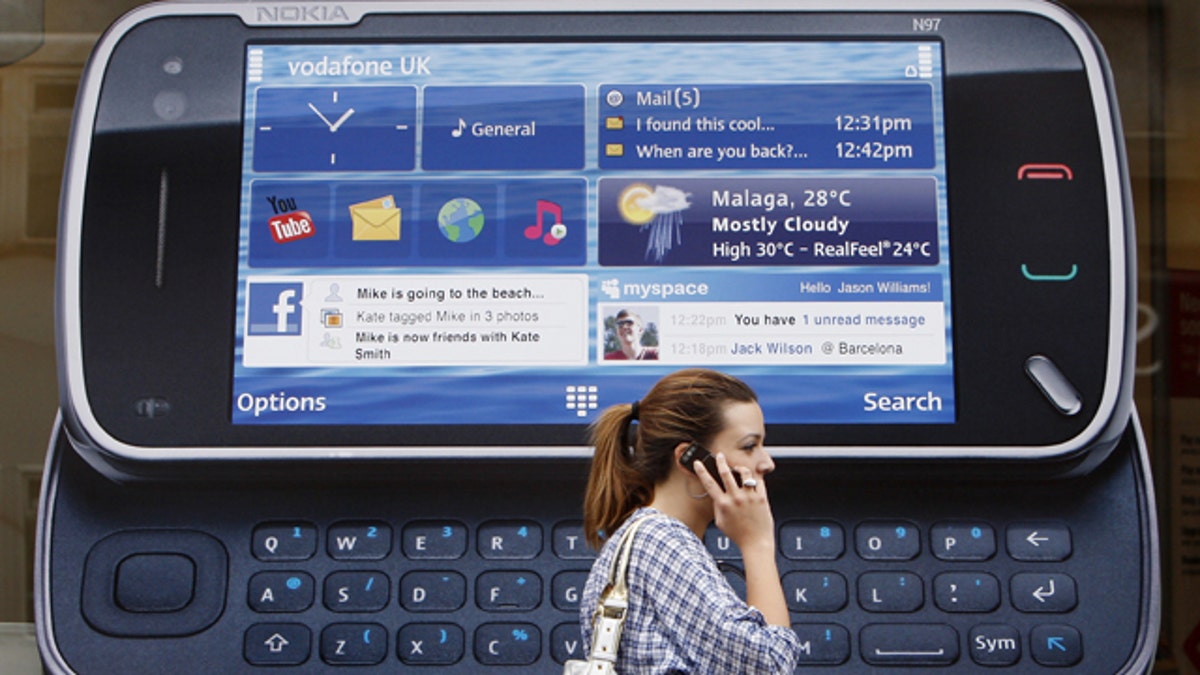
A woman uses her mobile telephone as she passes a Nokia advert in London. (REUTERS/Luke MacGregor)
BARCELONA -- Nokia and Intel are to merge their top-end smartphone operating systems, they announced on Monday, as they face increasing competition from newcomers Google and Apple.
The cellphone industry has started to focus increasingly on handset services and operating software after Apple launched its iPhone and Google rolled out its Android operating system -- helping to boost sales of top-end phones.
Now Nokia, the world's biggest maker of mobile handsets, will merge its Linux Maemo software platform, used in its flagship N900 phone, with Intel's Moblin, which is also based on Linux open-sourced software, the companies said on Monday.
"They have understood the only way to beat Microsoft and Apple is to do it through the scale -- get the platform to more devices," said John Strand, owner and chief executive of Strand Consult.
"However, they have not realized its not about getting to many platforms, its about making something the consumer likes -- the bees don't go for the biggest garden, they go for the most beautiful flowers," Strand said.
Nokia rolled out its first Maemo phone -- the result of a five-year development project -- only three months ago, with analysts seeing Maemo boosting the firm's chances of succeeding in the higher end of the market.
The market for software platforms on cellphones is led by Nokia's Symbian operating system, but it has lost much ground lately to Apple, BlackBerry maker Research in Motion and Google.
Nokia said it was still committed to using Symbian in most of its smartphones, but would use the new Meego in the most advanced models.
The software deal announced on Monday is also set to boost Intel's chances of getting its chips into the cellphones of the Finnish company, which controls around 40 percent of the global phone market.
"We believe the partnership ... will result in significant sales volumes for Intel," said CCS Insight analyst John Jackson.
LINUX GAINING TRACTION
Telecoms network operators have wanted a smaller number of operating systems, as supporting them is a timely and costly exercise, but the number of operating systems has in recent years only increased.
Now the open-source computer operating system Linux is starting to win traction, with Google using Linux for its Android platform, and Nokia rolling out its top-of-the-range model N900 using Linux Maemo.
"There has been a step change for Linux in mobile," Morgan Gillis, head of the wireless Linux system user foundation LiMo, said in an interview. "No other operating system now matches the vendor coverage of Linux -- it is being commercially deployed by virtually all leading mobile device vendors from the largest downwards."
Linux is the most popular type of free or so-called open source computer operating system which is available to the public to be used, revised and shared.
Linux suppliers earn money selling improvements and technical services, and Linux competes directly with Microsoft, which charges for its Windows software and opposes freely sharing its code.
